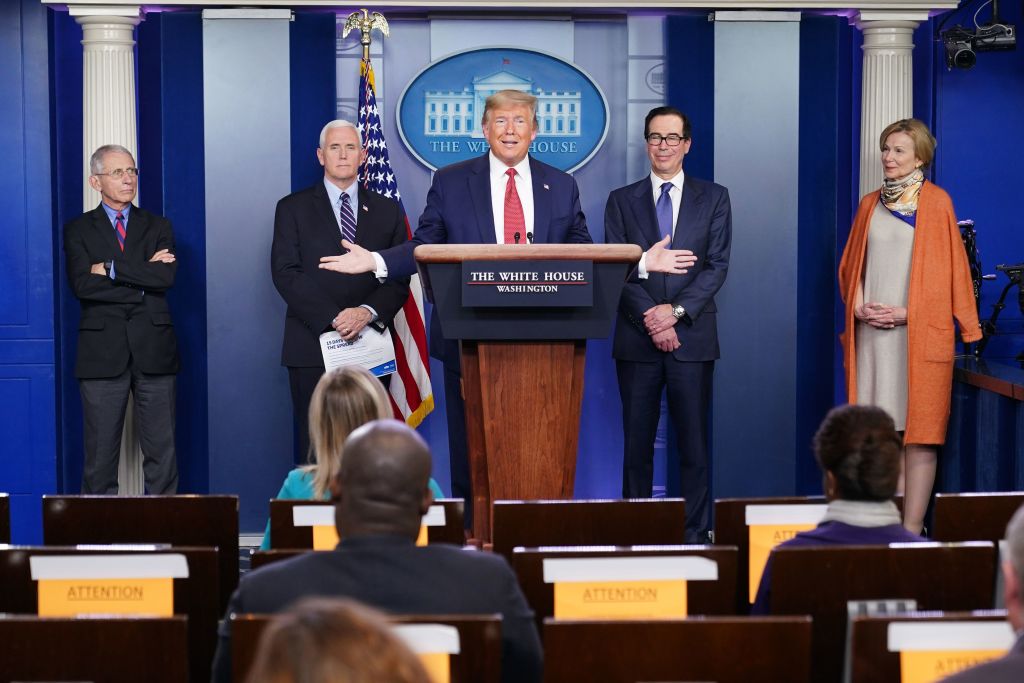Trump said he wanted to 'play down' coronavirus risk in March despite knowing it's 'deadly stuff'


A free daily email with the biggest news stories of the day – and the best features from TheWeek.com
You are now subscribed
Your newsletter sign-up was successful
President Trump always knew COVID-19 was dangerous, but admittedly didn't want to tell Americans that.
Trump talked to The Washington Post's Bob Woodward for Woodward's forthcoming book Rage back during in the early days of the coronavirus' arrival stateside. Trump knew the virus was "deadly stuff" back in early February, he said in a call at the time, but told Woodward on March 19 he wanted to "play it down," a preview of Rage published Wednesday reveals.
Trump had been getting intelligence briefings on the coronavirus months before it was confirmed to have arrived in the U.S. In one briefing on Jan. 28, National Security Adviser Robert O'Brien told Trump the virus "will be the biggest national security threat you face in your presidency," Woodward reports. Others in the room agreed, comparing this virus to the pandemic of 1918. Trump recounted what he'd learned from the COVID-19 briefings to Woodward in a Feb. 7 call, acknowledging it's "more deadly than even your strenuous flu."
The Week
Escape your echo chamber. Get the facts behind the news, plus analysis from multiple perspectives.

Sign up for The Week's Free Newsletters
From our morning news briefing to a weekly Good News Newsletter, get the best of The Week delivered directly to your inbox.
From our morning news briefing to a weekly Good News Newsletter, get the best of The Week delivered directly to your inbox.
But at the same time, Trump was downplaying the seriousness of COVID-19 to the nation, accusing the media of hyping it up to panic markets. It took him weeks to start admitting how deadly the virus actually is, though he has downplayed its spread and mortality rate in the U.S. to this day. And in March, Trump told Woodward point blank that this was always part of his strategy: "I wanted to always play it down," he said. Read more at The Washington Post.
A free daily email with the biggest news stories of the day – and the best features from TheWeek.com
Kathryn is a graduate of Syracuse University, with degrees in magazine journalism and information technology, along with hours to earn another degree after working at SU's independent paper The Daily Orange. She's currently recovering from a horse addiction while living in New York City, and likes to share her extremely dry sense of humor on Twitter.
-
 What are the best investments for beginners?
What are the best investments for beginners?The Explainer Stocks and ETFs and bonds, oh my
-
 What to know before filing your own taxes for the first time
What to know before filing your own taxes for the first timethe explainer Tackle this financial milestone with confidence
-
 The biggest box office flops of the 21st century
The biggest box office flops of the 21st centuryin depth Unnecessary remakes and turgid, expensive CGI-fests highlight this list of these most notorious box-office losers
-
 Key Bangladesh election returns old guard to power
Key Bangladesh election returns old guard to powerSpeed Read The Bangladesh Nationalist Party claimed a decisive victory
-
 Epstein files topple law CEO, roil UK government
Epstein files topple law CEO, roil UK governmentSpeed Read Peter Mandelson, Britain’s former ambassador to the US, is caught up in the scandal
-
 Iran and US prepare to meet after skirmishes
Iran and US prepare to meet after skirmishesSpeed Read The incident comes amid heightened tensions in the Middle East
-
 EU and India clinch trade pact amid US tariff war
EU and India clinch trade pact amid US tariff warSpeed Read The agreement will slash tariffs on most goods over the next decade
-
 Israel retrieves final hostage’s body from Gaza
Israel retrieves final hostage’s body from GazaSpeed Read The 24-year-old police officer was killed during the initial Hamas attack
-
 China’s Xi targets top general in growing purge
China’s Xi targets top general in growing purgeSpeed Read Zhang Youxia is being investigated over ‘grave violations’ of the law
-
 Panama and Canada are negotiating over a crucial copper mine
Panama and Canada are negotiating over a crucial copper mineIn the Spotlight Panama is set to make a final decision on the mine this summer
-
 Why Greenland’s natural resources are nearly impossible to mine
Why Greenland’s natural resources are nearly impossible to mineThe Explainer The country’s natural landscape makes the task extremely difficult
